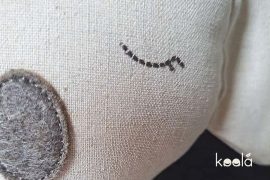Two of the major players in this magical baby love potion are prolactin – a hormone that promotes milk production and is often referred to as ‘the mothering hormone’ because of its calming effect that is said to make you more responsive to your baby – and oxytocin, also known as the ‘love hormone’. Oxytocin encourages feelings of caring and sensitivity to others and helps us to recognise non-verbal cues more readily. It is released during social contact as well as during love-making, but the release of oxytocin is especially pronounced with skin-to-skin contact. Oxytocin itself is part of a complex hormonal balance. A sudden release creates an urge towards loving that can be directed in different ways depending on the presence of other hormones. For example, with a high level of prolactin, the urge to love is directed towards your baby.
Breastfeeding is a powerful enhancer of the effects of these love hormones, which are released by both mothers and babies, who produce their own oxytocin in response to nursing. However, physical contact with your baby will also stimulate the release of oxytocin, so if you are bottle-feeding you can chemically boost the bond with your baby if you ‘bottle nurse’ with cuddles and skin contact, rather than prop him up to feed (something you should never do, for safety reasons) or hand him to others.
…close contact with your baby releases your own oxytocin and prolactin and encourages you to become more involved with your child
Fathers, too, can succumb to the influence of these love drugs of family (not just baby) bonding (and you thought you were the ‘voice of reason’, didn’t you?). Men’s bodies are instinctively programmed to respond to their partners’ pheromones, which are steroid hormones made in our skin that emit barely detectable odours. Through closeness with your baby’s mother (and signals from her pheromones), your own oxytocin and prolactin levels rise toward the end of your partner’s pregnancy, and then,when your baby is born, an even greater surge of these hormones occurs when you spend lots of time holding your baby. And so a self-perpetuating cycle begins – close contact with your baby releases your own oxytocin and prolactin and encourages you to become more involved with your child.
Whichever parent you are – and whether you are an adoptive parent or a same sex partner – the more you connect with your baby through touch, eye contact, smell and talking, the stronger your connection will be and the more difficult you will find it to ignore your baby’s signals. And this is exactly as nature intended.
If you are feeling confused about baby sleep advice, creating ‘bad habits’ or wondering, how can I gently encourage sound sleep? See Pinky’s best selling books Sleeping Like a Baby. and Parenting by Heart.
Originally published HERE.
Pinky McKay is an International Board Certified Lactation Consultant and best selling author of Parenting by Heart, Sleeping Like a Baby and Toddler Tactics. See Pinky’s books here.
You can download the first chapter of Pinky’s Book Sleeping Like a Baby FREE.










